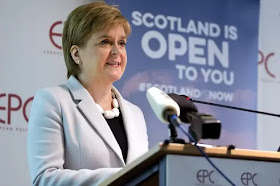Coronavirus: UK begins injecting AstraZeneca and Oxford vaccine
British authorities have ordered 100 million doses of AstraZeneca-Oxford vaccine, of which 520,000 are ready on Monday
The Pfizer-BioNTech vaccine has already been injected into more than one million Britons since the launch of the vaccination campaign in early December. On Monday, the UK becomes the first to give its population the vaccine from the British laboratory AstraZeneca and the University of Oxford against Covid-19, while considering a new severe round of screws to curb the worsening of the pandemic.
AstraZeneca-Oxford's vaccine is less expensive, easier to store and therefore more suitable for a large-scale immunization campaign than those of its competitors Moderna and Pfizer-BioNTech, already approved and distributed in several countries, including the United States.
British authorities have ordered 100 million doses of AstraZeneca-Oxford's vaccine, of which 520,000 are ready on Monday, according to the Department of Health. In England, hundreds of new vaccination centres are due to open this week, in addition to the 730 already in place.
"I am delighted today to launch the Oxford vaccine, inherited from British science," Health Minister Matt Hancock said in a statement on Monday. "This is a turning point in our fight against this horrible virus and I hope it will give everyone hope that the end of this pandemic is in sight."
The AstraZeneca-Oxford vaccine was also approved by Argentina as well as India on Sunday, which will allow the country of 1.3 billion people to start one of the world's most massive immunization campaigns. India,where the Covid-19 has claimed more than 150,000 lives, wants to immunize up to 300 million people by mid-2021.
Temperature issue
The AstraZeneca-Oxford vaccine has the advantage of being inexpensive (about 2.50 euros per dose). It can also be stored at the temperature of a refrigerator, unlike Moderna and Pfizer-BioNTech vaccines, which can only be stored at very low temperatures in the long term (-20 degrees Celsius for the first, -70 degrees Celsius for the latter).
However, its authorisation within the European Union is not expected to take place in January, according to the European Medicines Agency (EMA). The United States,for its part, does not plan to approve it until April.
With more than 75,000 deaths, the UK is one of the most bereaved countries in Europe by coronavirus. Nearly 55,000 more people tested positive for the virus in 24 hours, exceeding the 50,000 threshold for the sixth day in a row, according to the latest official data released on Sunday. The rapid expansion of the epidemic, attributed to a new variant of the virus, has led British Prime Minister Boris Johnson to consider stricter restrictions.
"We may have to do things in the coming weeks that will be more difficult in many parts of the country," Boris Johnson told the BBC on Sunday. He added that the closure of schools, a measure taken at the end of March during the first wave of the pandemic, "is one of those things."
Egypt chooses Chinese vaccine
Egypt, the Arab world's most populous country with some 100 million people, has announced that it has approved the vaccine developed by China's Sinopharm. Mexico, meanwhile, reported that more than 20% of the country's health care workers, or about 28,000 people out of 150,000, had already received a first dose of the Pfizer-BioNTech vaccine.
According to figures published by their manufacturers, Sinopharm's vaccine is 79% effective, Pfizer-BioNTech's 95% and Moderna's 94.1% effective. AstraZeneca-Oxford, for its part, claimed an efficacy rate of 70%, but that could reach 100% with two doses. While the arrival of vaccines gives hope of an improvement at the beginning of the year, the production and supply rates are still far from satisfactory.
The vaccination campaign in the United States is ramping up and could reach one million injections a day, officials said Sunday in the face of criticism of its initial delay, in a country that has just passed the 350,000-dead mark.
Inadequate production
The European Union on Saturday acknowledged a "global shortfall" in vaccine production capacity, saying it was "ready to help" to increase vaccine production capacity. For Hungarian Prime Minister Viktor Orban, however, it is the pace of the EU's acquisition of vaccines that is at issue. Products "were available earlier in Canada, the United Kingdom and Israel," he said on Sunday.
In France, Professor Mehdi Mejdoubi, from the hospital in Valenciennes (north), does not understand "why there is such a gap with Germany: Germany vaccinates 20,000 people a day, we are 50 people vaccinated per day". Since last Sunday, more than 238,000 people (238,809) have been vaccinated in Germany, according to the Robert Koch Institute for Health Watch.
South Africa, also hard hit by the second wave of the pandemic, hopes to get its first vaccines in February but the timing will depend on the outcome of ongoing negotiations with several pharmaceutical companies, the health minister announced on Sunday.
In recent weeks, the South African government has come under fire, including from health experts in the country, for delaying the process of acquiring vaccines against Covid-19. The pandemic has killed at least 1,835,824 people worldwide and more than 84,508,990 cases of infection, according to a report by AFP from official sources on Sunday.
Source:- Flash News and News Agencies












